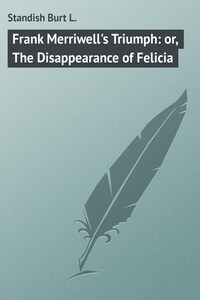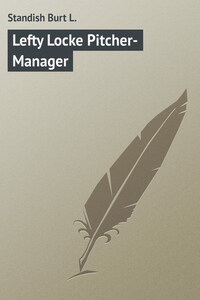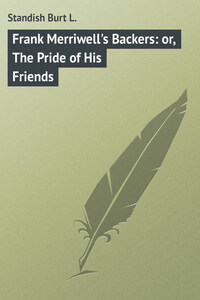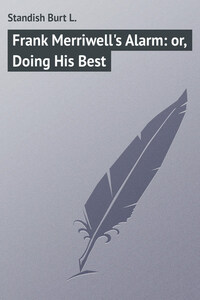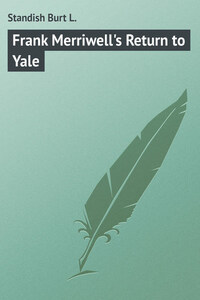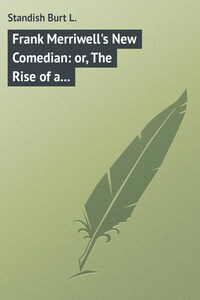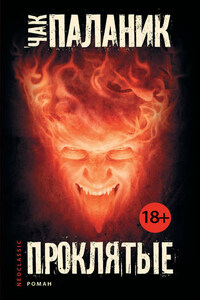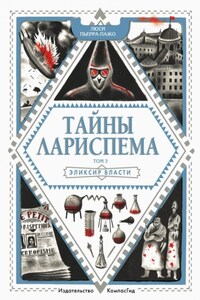CHAPTER I.
A COMPACT OF RASCALS
They were dangerous-looking men, thirty of them in all, armed to the teeth. They looked like unscrupulous fellows who would hesitate at no desperate deed. Some of them had bad records, and yet they had served Frank Merriwell faithfully in guarding his mine, the Queen Mystery, against those who tried to wrest it from him by force and fraud.
Frank had called these men together, and he now stood on his doorstep in Mystery Valley, Arizona, looking them over. Bart Hodge, Frank’s college chum and companion in many adventures, was behind him in the doorway. Little Abe, a hunchback boy whom Merriwell had rescued from ruffians at a mining camp and befriended for some time, peered from the cabin. Merry smiled pleasantly as he surveyed the men.
“Well, boys,” he said, “the time has come when I shall need your services no longer.”
Some of them stirred restlessly and looked regretful.
“To tell you the truth,” Frank went on, “I am genuinely sorry to part with you. You have served me well. But I need you no more. My enemies have been defeated, and the courts have recognized my rightful claim to this property. You fought for me when it was necessary. You risked your lives for me.”
“That’s what we is paid for, Mr. Merriwell,” said Tombstone Phil, the leader. “We tries to earn our money.”
“You have earned it, every one of you. I remember the day we stood off a hundred painted ruffians in the desert; I remember the hunting of Jim Rednight; and I don’t forget that when Hodge and I stood beneath a tree near Phœnix, with ropes about our necks, that you charged to the rescue and saved us. Have I paid you in a satisfactory manner?”
“Sure thing!”
“You bet!”
“That’s whatever!”
“You don’t hear us kick any!”
“We’re satisfied!”
These exclamations were uttered by various men in the gathering.
“I am glad to know, boys,” declared Frank, “that you are all satisfied. If you must leave me, I like to have you leave feeling that you have been treated on the square.”
“Mr. Merriwell,” said Mexican Bob, a wizened little man, “I ken chew up the galoot what says you ain’t plumb on the level. Thar’s nary a critter in the bunch whatever makes a murmur about you.”
“You can see, boys,” Frank went on, “that I have no further use for you as a guard to my property. If any of you wish to remain, however, I shall try to find employment for you. There’s work enough to be done here, although it may not be the sort of work you care to touch. I need more men in the mine. You know the wages paid. It’s hard work and may not be satisfactory to any of you.”
The men were silent.
“As we are parting,” Merry added, “I wish to show my appreciation of you in a manner that will be satisfactory to you all. For that purpose I have something to distribute among you. Hand them out, Hodge.”
Bart stepped back and reappeared some moments later loaded down with a lot of small canvas pouches.
“Come up one at a time, boys,” invited Merry, as he began taking these from Bart. “Here you are, Phil.”
He dropped the first pouch into Tombstone Phil’s hand, and it gave forth a musical, clinking sound that made the eyes of the men sparkle.
One by one they filed past the doorstep, and into each outstretched hand was dropped a clinking canvas pouch, each one of which was heavy enough to make its recipient smile.
When the last man had received his present, they gathered again in front of the door, and suddenly Tombstone Phil roared:
“Give up a youp, boys, for the whitest man on two legs, Frank Merriwell!”
They swung their hats in the air and uttered a yell that awoke the echoes of the valley.
“Thanks, men,” said Merry quietly. “I appreciate that. As long as you desire to remain in Mystery Valley you are at liberty to do so; when you wish to depart you can do so, also. So-long, boys. Good luck to you.”
He waved his hand, and they answered with another sharp yell. Then they turned and moved away, declaring over and over among themselves that he was the “whitest man.” One of those who repeated this assertion a number of times was a leathery, bowlegged, bewhiskered individual in greasy garments known as Hull Shawmut. If anything, Shawmut seemed more pleased and satisfied than his companions.
The only one who said nothing at all was Kip Henry, known as “the Roper,” on account of his skill in throwing the lariat. Henry was thin, supple, with a small black mustache, and in his appearance was somewhat dandified, taking great satisfaction in bright colors and in fanciful Mexican garments. He wore a peaked Mexican hat, and his trousers were slit at the bottom, Mexican style. Several times Shawmut glanced at Henry, noting his lack of enthusiasm. When the Thirty retired to their camp down the valley and lingered there, Henry sat apart by himself, rolling and smoking a cigarette and frowning at the ground.
“What’s the matter, pard?” asked Shawmut, clapping him on the shoulder. “Didn’t yer git yer little present?”
“Yes, I got it,” nodded the Roper.
“Then what’s eating of yer?”
“Well, Shawmut, I am a whole lot sorry this yere job is ended. That’s what’s the matter. It certain was a snap.”
